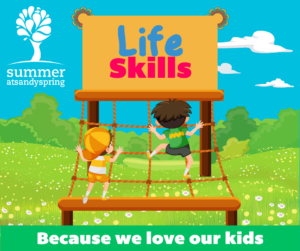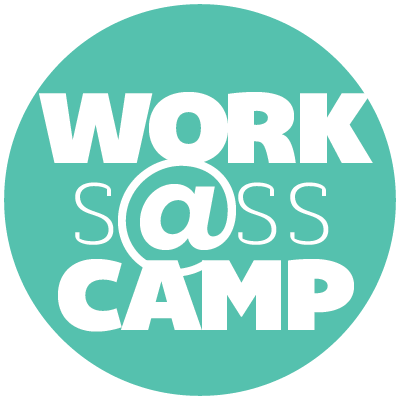Life Skills
A huge part of the summer camp experience

Have you noticed a theme in our series yet? It’s “Because we love our kids”, and the team behind Summer at Sandy Spring (SaSS) used this prompt to determine a multitude of ways we prepare and support our children to help them thrive. For example, in today’s email: because we love our kids, we prepare them to become productive citizens and functional adults. No small feat, so how do we do it? The answer is life skills training and education, and believe it or not, it’s a huge part of the summer camp experience at SaSS.
First, we have to address the definition of “Life Skills”. These aren’t just buzzwords to be thrown around; they’re a set of interrelated skills that should be taught to all children to empower them to be their most healthy, successful, and socially responsible selves. The World Health Organization (WHO) and the United Nations Children’s Fund (UNICEF) both report that life skills run the gamut from cognitive skills that help children make informed decisions to emotional and psychosocial skills which build supportive social relationships and improve self-regulation.
It’s apparent that life skills training is crucial. However, despite the need, most formalized life skills education training programs don’t start until after the first four years of elementary school, leaving a broad gap in intervention. Luckily, the skills your child is acquiring through summer camp address these areas and get your early learner a head start.
Educational psychology researchers have narrowed life skills down into three broad domains:
1. Communication and interpersonal skills
2. Decision-making and critical-thinking skills
3. Coping and self-management skills
Communication and interpersonal skills are called “soft skills” but in today’s ever-present world of constant and rapid-fire communication, they’re more necessary than ever. Just by engaging with their peers in active play, participating in regular daily social activities, and imitating others, children develop a sense of agency and self, learn patterns of cause and effect, and obtain modalities of social interactions and conversations.
With exposure to a variety of peers (such as the kind they receive playing with new friends at summer camp!), children learn different emotional and social experiences in a safe place. This exposes them to the varied preferences, beliefs, values, attitudes, and identities of others. Furthermore, the presence of strong and positive role models teaches them the value of their own health and the health and prosperity of others.
Decision-making and critical-thinking skills are closely linked to the cognitive domains of symbolic and abstract thinking. It’s not a coincidence that these areas of cognitive development occur around the same time children enter school. While formalized education solidifies these concepts, opportunities to make team decisions, work through logistics, plan, and see the outcome of planning efforts, such as when children must complete an obstacle course together, are also fabulous opportunities for growth.
Coping and self-management skills are not just tools for any child or adolescent to learn; they’re a defense system against the presence of internalizing disorders like depression and anxiety and have been definitively linked to personal and social success for adolescents and adults. By teaching our children these skills, we can negate high-risk behavior and provide them with higher mental well-being as they grow.
Learning resiliency (by trying again, even when it’s hard), self-efficacy (independent play and attempting new things), and self-esteem (by succeeding in a setting that’s safe and healthy) all occur in the positive and active environment of SaSS. There’s no better way to bridge the gap between school years than providing the exposure and experience to develop these skills at a summer camp that knows how to help your child grow, learn, and thrive.





